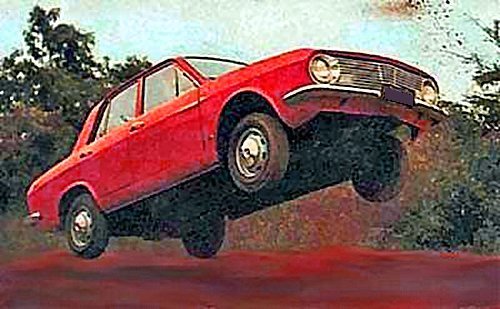|
Ok guys, no response from your end.....
ID 375: is the Iso Fidia
More about Iso:
Before the second world war, Renzo Rivolta had built up a succssful company, Isothermos, building refrigerators. The 1940s saw him turn his hand to scooters, keeping the well known Iso name. From this they progressed to the Isetta, a 236cc bike engine powered bubble car. This was built from 1953 to 55 (although licence production in other countries continued until 1964).
There was a delay before the next car arrived, and when it did it was a very different beast. The Rivolta was a two door, four seat rear-wheel drive saloon, powered by a 5359cc Chevrolet V8 ohv engine. This set the trend for future Iso's, with a chassis design by Bizzarrini, bodywork design by Bertone and the big Chevrolet engine.
Shortly afterwards the Grifo emerged from Iso's Milan factory. This used a similar engine and chassis to the Rivolta in a new two seat coupe body. The Fidia, which was introduced in 1967, was a four door, four seat saloon, still based on a similar combination of chassis and engine. The last production car from Iso was the Lele, a 2+2 coupe replacement for the Rivolta, still with basically the same engine and chassis.
In 1966 Renzo Rivolta, the man behind the company, passed away and his son Piero took control. The company made an ill-judged move into Formula One with Frank Williams and at about the same time the oil crisis hit. The combination of these events saw the closure of Iso in 1975.
Rivolta:
Iso Rivolta GT Introduced at the Turin Motorshow in 1962, the Rivolta was one of the early examples of Detroit meets Italy, with a front mounted Chevrolet 5358cc (101.6x82.55mm) ohv V8 driving the rear wheels through either an automatic transmission (also from Chevrolet) or a four speed manual from ZF and a bodywork designed and built by Bertone. The actual designer was Giugiaro whilst he was working for the latter company.
A separate boxed steel platform chassis frame was used, fitted with wishbones at the front and a de Dion layout at the back. Coil springs, hydraulic dampers and disc brakes (inboard at the rear) were to be found an all corners. The wheelbase was 2700mm whilst both the front and rear tracks were 1410mm and the empty weight was 1520kg.
Iso Rivolta GT cockpit Two versions, the IR300 and IR340, were built, the 300 and 340 referring to the power output of the engine, although various options were available, including a 365bhp version using an engine tuned in Italy and even a a four carburettor setup with 400bhp. A five speed transmission also became available during the cars production life. A total of 797 examples were built up until 1970 when production stopped.
It was available in white, grey (m), green (m), two blues, gold (m) and two reds (one m), those with (m) indicating metallic. The latter was an extra cost option, as were a leather interior, an electric sunroof, wirespoke wheels, wooden steering wheel (by Nardi) and air conditioning. Electric windows were standard.
Grifo:
Based heavily on the Rivolta, the Grifo was introduced in 1963 (click here to see the prototype) as the A3L. It used a slightly shorter wheelbase fitted with the same suspension, brakes, engines and transmissions, but clothed in an all new two door coupe body. The design was again by Bertone, but much more distinctive.
Over the years the Grifo was fitted with ever larger and more powerful versions of the Chevrolet engine, the ultimate 'Can Am' version using a 7.5 unit with nearly 400bhp (24 were built). A mild cosmetic facelift was also carried out in 1971 when the front became much lower (and supposedly more aerodynamic), and incorporated pop-up lights. Apart from the remodelled front, the only significant body variant was the targa version, of which only 17 were built. A Spider version was shown by Bertone at the 1964 Geneva Motorshow, but nothing came of the project. The last 37 cars used a 5.8-litre Ford engine.
Production continued until 1975 by which year Iso had built a total of 412 Grifo's.
To summarise, the engines used were :
5359cc (101.6x82.55mm) V8 with 300bhp @ 5,000rpm (later 350bhp @ 5,800rpm)
6998cc (107.95x95.5mm) V8 with 400bhp @ 5,200rpm
7443cc (107.95x101.6mm) V8 with 395bhp @ 4,800rpm (Can Am)
5733cc (101.6x88.39mm) V8 with 304bhp @ 4,800rpm (IR8)
The wheelbase remained constant at 2500mm, front and rear tracks at 1410mm. Braking was by discs all round, whilst the suspension employed an independent front setup and a de Dion layout at the back.
Fidia:
Iso FidiaThe next model to use the same chassis and mechanicals was the Fidia, introduced in 1967. This time the chassis was stretched slightly, and a four door saloon body designed by Ghia was added. The spacious interior was well equipped with such things as air conditioning etc.
Around one quarter of the 192 cars produced were fitted with a Ford 5.8 litre V8 instead of the Chevrolet unit. Production ceased in 1975.
Source: carsfromitaly.com
Last edited by islero : 21st October 2007 at 11:18.
| 








 )
)





